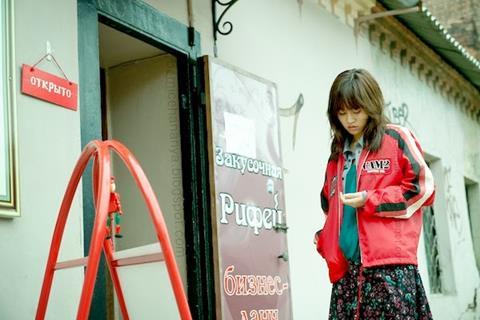Dir/scr: Kiyoshi Kurosawa. Japan 2013. 60mins

At first glance, The Seventh Code (Sebunsu Kodo) looks like a travelogue thrown together in a hurry and without much success to try and advertise the sights of the city of Vladivostok…a one hour capriccio which will be pretty much of a letdown for the admirers of Japan’s master of mystery and suspense.
Taken separately, each of the film’s sequences are shot and directed with the smooth, precise authority that clearly attests to Kurosawa’s high professional standards.
As for the director’s avowed intention to promote the career of his lead, Atsuko Maeda? Well, first of all she is already well established both as a singer and an actress, and a stronger vehicle would have served better to help her up to a higher level. At best to be taken as a kind of fairytale, which might explain the arbitrary meanders of the film’s plot…it has been occasionally advertised as Kurosawa’s first action movie, a gross exaggeration since there is only one sequence in the entire film to justify it.
With one exception, the film is shot entirely from the POV of a young woman, Akiko (Maeda). She comes to Vladivostok on the track of a man called Matsunaga (Ryohei Suzuki) who had accidentally invited her to have dinner with him one night in Tokyo and has never shown up again. She follows him to Vladivostok, and for the rest of the film she relentlessly chases him, running on foot after the car he drives until she catches him. He has another drink with her, warns her not to trust strangers in a foreign land, and disappears once more.
But Akiko is not the kind to give up once she has set her mind on something and she keeps on running after the elusive Matsunaga, while finding temporary shelter in a rundown café operated by a Japanese man and his Chinese girlfriend. Strangely enough she not only finds him riding in the same car but manages to run up the hill almost as quickly as the car does, follow him all the way to a disaffected warehouse, and from there on to his own flat.
At this point, Kurosawa introduces one major twist in the story to be followed yet another towards the end, neither one better founded or more plausible than anything that has taken place before but helping to end the story with a bang.
Taken separately, each of the film’s sequences are shot and directed with the smooth, precise authority that clearly attests to Kurosawa’s high professional standards. That they don’t seem to make much sense together suggests that Kurosawa may not have been terribly interested in the whole project.
Though there is an attempt to profile Vladivostok as a meeting place for strangers coming from different places around the world and there are a couple of remarks about the power of money, the film remains a totally inconsequential exercise whose main intention was to show Maeda deploying her full talents, running hysterically up and down streets, looking alternately embarrassed and determined, eager and innocent, mischievous and tricky, and reminding everyone, for the finale, of her singing abilities.
All this looks promising enough, but her gifts desperately need something more solid to lean on. As for the city of Vladivostok, a decent travelogue displaying its charms is still to be made.
Production companies: AKS, King Records, Nikkatsu, Django Film
Contact: King Records, akiko-uchida@kingrecords.co.jp
Cinematography: Shinya Kimura
Editor: Koichi Takahashi
Production designer: Norifumi Ataka
Music: Yusuke Hayashi
Main cast: Atsuko Maeda, Ryohei Suzuki, Aissy, Hiroshi Yamamoto





















